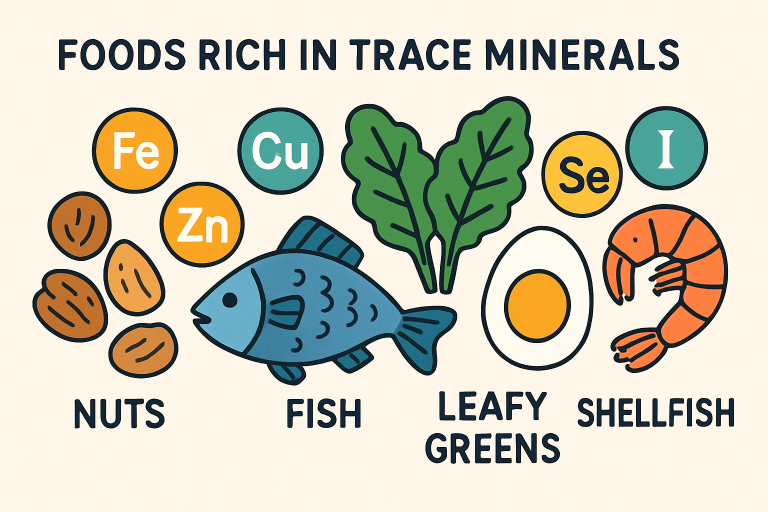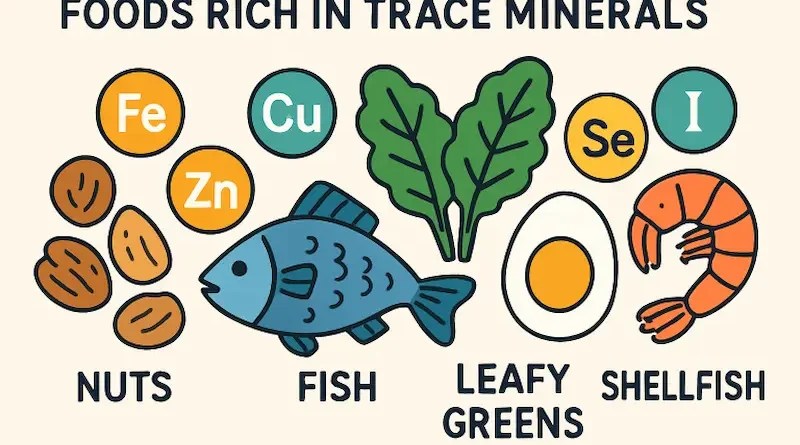Essential Trace Minerals: Their Role in Health and Wellness
Trace minerals, though needed in tiny amounts, are powerful allies that support our overall health. These micronutrients are fundamental to energy production, immune function, and many metabolic processes—making their consistent intake through diet or supplements crucial. For instance, the right balance of minerals such as iron, zinc, and copper vitamin ensures your body runs efficiently and remains resilient against disease.
What makes trace minerals unique is their broad spectrum of physiological impacts. Although we require them in small daily doses, the absence or deficiency of trace minerals can cause profound health disturbances, impacting everything from our energy levels to our hormonal balance. These micronutrients, often overshadowed by the better-known vitamins, deserve a closer look in the discussion about optimal nutrition.
Understanding Trace Minerals
Trace minerals, or trace elements, are minerals the body requires in amounts generally less than 100 milligrams daily. Despite this minuscule requirement, their role is anything but small. They become components of enzymes, hormones, and cells, supporting growth, maintenance, and restoration. Iron, zinc, selenium, iodine, and copper are some of the most significant trace minerals researched for human health.
While not always immediately evident, trace mineral deficiencies can lead to slow-developing health concerns such as anemia, lowered immunity, poor bone density, or sluggish metabolism. Symptoms might appear subtle at first—like unexplained tiredness or changes in hair and skin—but can progress to more serious chronic health conditions.
Eating a varied and nutrient-dense diet is one of the best ways to maintain the right balance of trace minerals. Experts often recommend habitual consumption of whole foods, lean proteins, nuts, and even fortified sources in cases of known deficiencies. Awareness of each mineral’s role in the body is key to understanding the value of maintaining balanced intake.

Review reliable health resources, such as Harvard T.H. Chan School of Public Health’s guide on vitamins and minerals, to deepen your understanding of micronutrients and their impact on health.
Energy Production and Metabolism
Trace minerals are deeply involved in metabolic pathways that generate energy, a process vital for sustaining life and activity. Iron, for instance, sits at the heart of hemoglobin molecules, enabling oxygen transport from lungs to tissues. When iron is in short supply, the body struggles to oxygenate its cells, resulting in chronic fatigue and weakened endurance. Similarly, copper is crucial for cellular respiration, which allows the body to convert food into usable energy (ATP). Without adequate copper, the efficiency of energy production drops, which can negatively affect stamina and cognitive function.
In addition to individual impacts, several trace minerals work synergistically. Iron and copper, for example, depend on each other to facilitate optimal red blood cell production and healthy metabolism, making balanced intake even more important. More information about the synergy between minerals and metabolism can be found at Medical News Today.
Immune System Support
An efficient immune system is contingent on a multitude of trace minerals. Zinc stands out for its direct involvement in immune cell development and function. It regulates the production of signaling molecules and plays a vital role in the maturation of white blood cells. Selenium, another heavy hitter, boosts immunity by preventing oxidative stress and inflammation, often as a defensive shield against pathogens and cellular damage. Diets rich in these minerals reduce susceptibility to infectious illnesses and help the body recover more swiftly from strain and injury.
Bone Health and Development
Calcium, vitamin D, and trace minerals like manganese and copper sustain bone health. Manganese is needed to form bone cartilage and collagen, both of which give bones their structure and flexibility. Copper further supports bone health by helping to synthesize cross-links in connective tissue, ensuring the resilience and stability of joints. Without enough intake of these minerals, people are at higher risk of bone demineralization, increased fracture risks, and conditions such as osteoporosis as they age.
Thyroid Function and Hormonal Balance
The endocrine system relies heavily on specific trace minerals. Iodine is necessary for thyroid hormone synthesis, directly influencing basal metabolic rate, energy, and development. Selenium’s primary role here is to enable the conversion of thyroid hormones into their active state, thereby optimizing the function of the thyroid gland. Inadequate iodine or selenium impairs hormone production, often manifesting as fatigue, weight fluctuations, or other symptoms associated with hormonal imbalance. Long-term deficiencies can even contribute to disorders such as hypothyroidism or goiter.
Sources of Trace Minerals
Diets encompassing diverse food groups make fulfilling your daily trace mineral needs easier. Rich natural sources include:
- Iron: Lean red meats, chicken, oily fish, lentils, spinach, and fortified cereals.
- Zinc: Oysters, beef, pumpkin seeds, chickpeas, and whole grains.
- Copper: Shellfish such as oysters and crab, nuts, sunflower seeds, and whole wheat products.
- Selenium: Brazil nuts (one of the highest natural concentrations), seafood, and eggs.
- Iodine: Seaweed, milk, yogurt, cheese, and iodized table salt.
Maintaining dietary diversity ensures a sufficient supply of these crucial minerals while reducing the risk of nutrient gaps, especially for those with dietary restrictions or increased physiological needs.
Conclusion
Even in minute amounts, trace minerals wield an outsized influence over our health. Their collective contributions are foundational to our well-being, from powering energetic lives and resilient immune systems to strengthening bones and balancing hormones. By making mindful choices and embracing a diverse, nutrient-rich diet, individuals can easily safeguard their health and offset the risks associated with deficiency. For more details about the science behind trace minerals, visit the CDC’s guide to vitamins and minerals.
Visit the rest of the site for more interesting and useful articles.

